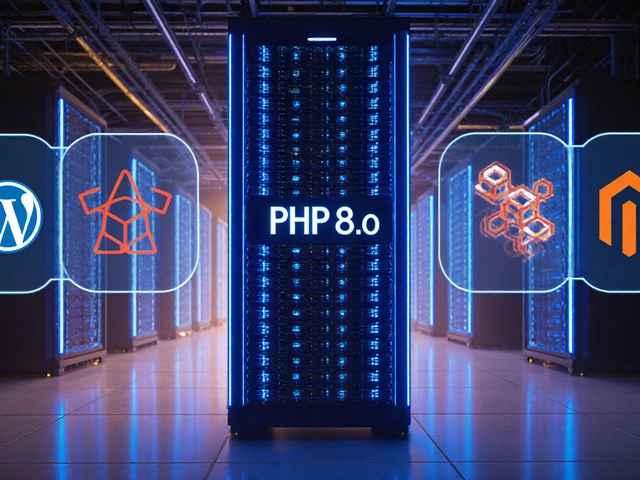When diving into the world of programming, it's not uncommon to wonder how different languages compare to one another, especially when their purposes overlap. C++ and PHP, despite their distinctive areas of focus, share intriguing similarities as much as they have stark differences.
C++ stands tall as a stalwart in system-level programming, like a well-oiled machine known for its speed and ability to handle low-level operations. PHP, meanwhile, thrives on the web, bringing dynamic and interactive experiences to life with its server-side scripting capabilities.
Exploring how these two languages stack up against each other in terms of syntax, available use cases, and performance can offer invaluable insights. Understanding these facets might just be the deciding factor in selecting the best language for your next project.
- Understanding Syntax Differences
- Use Cases for Each Language
- Performance and Efficiency
- Choosing the Right Tool for the Job
Understanding Syntax Differences
To truly grasp how C++ and PHP differ, one must first look at the syntax of each language and how it shapes the way we write code. C++, a stalwart in the programming community, is known for its strong emphasis on type safety and object-oriented paradigms. On the other hand, PHP is a scripting language designed to be embedded within HTML, and it's lauded for its flexibility and ease of use. Both languages, however, share roots in C, leading to some syntactical similarities and possibly easing the transition for programmers familiar with either.
Starting with C++, it is known for its strict syntax rules. Every line must be carefully structured, much like a meticulous architect ensuring every beam and column is in place before proceeding to the next stage. For instance, C++ requires declarations of variables with explicit types, which helps in avoiding errors that might otherwise crop up unexpectedly. This focus on type safety and explicit declarations means that everything in C++ must be out in the open before the compiler can make sense of it, leaving no room for ambiguity.
PHP, on the flip side, takes a more fluid approach, often appealing to novices and experts who appreciate swift results. PHP scripts are executed on the server, and the code is written alongside HTML, where it seamlessly blends with web pages to generate dynamic content. This scripting language permits the use of variables without declaring types, offering a kind of flexibility that's akin to a potter shaping clay—they can rapidly mold and tweak the shape of their application with far less procedural overhead than C++.
The difference in syntax between these languages is indicative of their targeted uses. An enlightening perspective can be found in the words of Bjarne Stroustrup, the creator of C++, who noted,
“C++ is designed to be a modern, general-purpose programming language with a bias towards systems programming that is a better C; supports data abstraction, object-oriented programming, and generic programming.”This quote highlights the language's structured nature and its alignment with more intricate, system-based tasks.
While PHP has its origins in dynamic web content creation, it has evolved over time to include support for object-oriented programming. This evolution has resulted in a contemporary PHP that can be remarkably sophisticated in its own right. Developers who are seasoned in C++ might find PHP's dynamic typing somewhat jarring at first, but they often come to appreciate the simplicity and speed with which they can develop cross-platform applications. Both languages have thriving communities and extensive libraries, contributing to their resilience and suitability for varied project scales.
Ultimately, understanding the syntax differences between C++ and PHP not only showcases the unique strengths each language brings to the table, but also reflects the evolution of programming paradigms over time. With each line of code, a developer writes, the choice of language echoes the specific needs, goals, and challenges they are set to tackle. It's in this choice that the contrasts between C++ and PHP become most apparent, setting the stage for projects that range from low-level system functions to the dynamic expanses of the web.

Use Cases for Each Language
The choice between C++ and PHP often boils down to the problem you're hoping to solve. Each language has carved out its niche, excelling in certain domains. C++, with its prowess in system programming, becomes indispensable in areas demanding high performance and access to hardware resources. It's the backbone of operating systems, drivers, and real-time simulation programs where speed isn't just an advantage but a necessity. The game development industry, known for pushing the limits of hardware, relies on C++ to deliver breathtakingly complex and resource-heavy 3D environments. That's because C++ can manipulate graphics at a very low-level, thus maximizing the use of expensive GPU resources.
Another domain where C++ finds itself indispensable is in financial systems. High-frequency trading firms opt for C++ due to its ability to execute multiple transactions within microseconds without compromising on precision or reliability. These firms need an efficient language to complement their complex algorithms, and C++ delivers just that. In addition, C++ is a favorite for developing complex application software and hardware design simulations as it provides fine control over system resources.
On the flip side, PHP dominates the web development landscape. Initially standing for Personal Home Page Tools, it has evolved into a powerful server-side scripting language designed to make page generation easy and interactive. PHP works seamlessly with databases like MySQL to create database-driven websites. This makes it the language of choice for content management systems (CMS) like WordPress, Joomla, and Drupal, empowering around 80% of websites on the internet. With PHP, developers can write simple scripts swiftly or write code domaining in object-oriented style for more complex applications.
"PHP performs gracefully in web environments, offering an elegant balance of simplicity and power that accelerates development cycles," says Rasmus Lerdorf, the creator of PHP.
Furthermore, PHP stands out for enabling easy web server integration, session creation, and email capabilities - thanks to its broad set of built-in functions. Hosting sites often come with native PHP support, underscoring its ubiquity in web hosting. Moreover, with robust frameworks like Laravel, Symfony, and CodeIgniter, PHP continues to build reliable and secure web applications, catering to scalable, enterprise-level projects.
Both languages boast extensive communities and resources, safeguarding their longevity and relevance. For developers keen on optimizing system resources or venturing into zero-delay environments, the low-level access granted by C++ remains unmatched. Meanwhile, those eager to craft vibrant, data-driven websites find PHP's ease of use and ready web hosting support irresistible. The decision to go with either C++ or PHP is frequently guided by your specific project goals. With a solid grasp on the domains where each excels, developers can confidently pivot between these technological titans to accomplish their objectives with efficiency and prowess.

Performance and Efficiency
When examining the performance and efficiency of both C++ and PHP, it's essential to understand their foundational purposes and how they operate. C++ is celebrated for its incredible efficiency and speed, thanks to its close-to-the-metal nature. As a compiled language, C++ translates code directly into machine language, allowing for streamlined execution at the hardware level. This is precisely why industries that demand high performance, such as gaming, scientific computing, and real-time simulations, often prefer C++ as their go-to language. Such environments require quick and reliable processing power, an area where C++ truly shines.
On the other hand, PHP is interpreted at the runtime, designed primarily to handle server-side scripting within web applications. While it may not match C++ in raw physical performance due to its interpreted nature, PHP offers other types of efficiency, especially in the context of web development. Its built-in functions and low barrier to entry make it a favorite among newcomers and seasoned developers looking for rapid development cycles. PHP's ecosystem supports a vast number of libraries and frameworks, which can drastically cut down development time and enhance productivity. This flexibility is invaluable for web developers who need to adapt quickly to the ever-changing digital landscape.
Real-world Performance
Real-world applications highlight how performance can vary between these two languages. C++ applications are often seen in environments where response time and minimum resource usage are critical. The language's ability to manage memory and optimize storage is unmatched, making it ideal for operating systems, games, and even some high-performance web backends. PHP, although slower in raw execution, compensates with hyper-fast iteration speeds. Its syntax is forgiving, allowing developers to build and deploy web applications efficiently. This script-centric language thrives in creating user-facing software like content management systems, forums, and dynamic web pages.While discussing these differences, one might recall the words of Bjarne Stroustrup, the creator of C++, "Design and programming are human activities; forget that and all is lost." This reminder highlights the idea that both these languages, at their core, are tools meant to serve human problem-solving needs. When developers understand the nuances in performance and efficiency of these two languages, they are better equipped to make informed decisions that align with project goals.
Statistical Insights
Let's consider some statistics to provide further clarity. According to various benchmarks, pure execution speed is where C++ takes the crown. Here's a quick comparison in a hypothetical study involving a computational task:| Language | Execution Time (sec) |
|---|---|
| C++ | 0.8 |
| PHP | 3.2 |
While PHP may lag behind in computation-heavy tasks, it's important to focus on its strengths. PHP scripts are easier to maintain and usually integrate seamlessly with other technologies like HTML and CSS. This integration capability makes it a powerful tool for full-stack web development. Understanding these performance metrics allows developers to leverage each language's strengths effectively.

Choosing the Right Tool for the Job
When it comes to selecting between C++ and PHP for your development needs, it's essential to consider the unique strengths and best-use scenarios of each language. C++ excels in performance-critical applications requiring fine-grained control over resources and execution. Its prowess is particularly evident in areas like game development, where the need for speed and efficiency is paramount, as well as in system software and applications where direct hardware interaction is essential. Developers often lean towards C++ for desktop applications and large-scale systems where they can leverage its robust memory management capabilities and object-oriented programming features.
On the flip side, PHP shines brightly in web development with its ability to integrate seamlessly with HTML, making it a favorite for creating dynamic and interactive websites. Its syntax is simple to understand, which has contributed significantly to its widespread adoption among web developers. PHP's vast array of frameworks like Laravel and Symfony simplify back-end development, providing a rich set of tools and libraries to tackle complex server-side challenges efficiently. This makes PHP an ideal choice for developing content management systems (CMS), customer relationship management (CRM) platforms, and ecommerce websites.
Jack Dorsey once said, "Complexity is expensive and simple can be harder than complex." PHP embodies simplicity in web development, allowing developers to focus on functionality, often making it the right tool for rapidly evolving online environments.
When deciding between C++ and PHP, it's equally important to consider the long-term support and community resources available for each language. C++ has a venerable history with extensive documentation and a global community contributing to its legacy and innovation. It's supported across virtually every hardware platform, from small embedded systems to large-scale enterprise solutions. In contrast, PHP enjoys immense popularity in the web space, with a vibrant and active community continually evolving the language and its ecosystem of tools. This means plenty of open-source projects and a plethora of online resources to aid in debugging and development, making it straightforward to find help and learn best practices.
If you're torn between these two, consider the type of application and the environment it will run in. For high-performance applications interacting closely with hardware, C++ is often unmatched. But if the goal is to deliver a robust web experience with a quick turnaround, PHP provides the agility needed to cater to evolving internet standards and user demands. Ultimately, both languages have their place in the world of development, and often, understanding the project requirements in detail can guide developers to choose appropriately, ensuring both efficiency and scalability.





